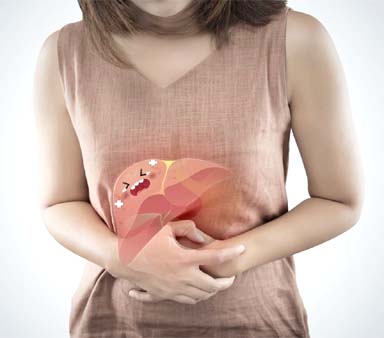DE Online Desk:
Often, you cannot know whether you have liver cirrhosis until the disease is advanced. Only your health care provider can tell you if you have cirrhosis.
There are many signs of cirrhosis that your provider may find. You may have red palms or small spider-like veins on your face or your body. You may have developed fluid in your abdomen.
Your provider may order blood tests that point to cirrhosis. Other tests can also give your provider a good idea of whether you have cirrhosis, such as an ultrasound, a CAT scan, an MRI, or a special kind of ultrasound that measures the amounts of stiffness in your liver (as the liver gets scarred, it gets stiffer).
Sometimes, you may need a liver biopsy. A liver biopsy shows how much scarring your liver has and will help your health care provider figure out what is causing the damage and how best to treat it.
Common symptoms of liver cirrhosis are:
1. Chronic fatigue:
The liver cleanses the body of toxins and helps produce energy. In cirrhosis, this function decreases, resulting in weakness and drowsiness.
2. Loss of appetite and weight loss:
Liver disease causes digestive problems, resulting in decreased appetite. In addition, weight loss occurs because the body is unable to absorb the necessary nutrients.
3. Ascites:
In cirrhosis, blood flow is obstructed, resulting in fluid accumulation in the abdomen and swelling. This is a major symptom of cirrhosis.
4. Yellowing of the eyes and skin (jaundice):
When the liver is unable to process a substance called bilirubin, it accumulates in the blood, causing the skin and eyes to look yellow. This is a clear indication of liver problems.
5. Swollen hands and feet:
When the liver reduces protein production, pressure increases in the blood vessels and water accumulates in the lower parts of the body (especially the legs and feet).
6. Itchy skin:
The liver causes bile salts to accumulate in the body, which causes itchy skin.
7. Spider angiomas:
Small blood vessels under the skin burst and look like a reddish web, especially on the chest and face. This is caused by hormonal imbalance.
8. Breast enlargement and sexual weakness in men:
Hormonal imbalance is disrupted in cirrhosis. This increases estrogen in men, which can lead to increased breast size and decreased sexual ability.
9. Effects on the brain (Hepatic encephalopathy):
If the liver cannot clear toxins from the blood, those toxins can reach the brain and cause confusion, misunderstandings, drowsiness and even coma.
10. Blood in stool or black stool (GI bleeding):
In cirrhosis, the blood vessels in the esophagus become swollen (varices), which can burst and bleed. This is the reason for the appearance of blood or black stool.

